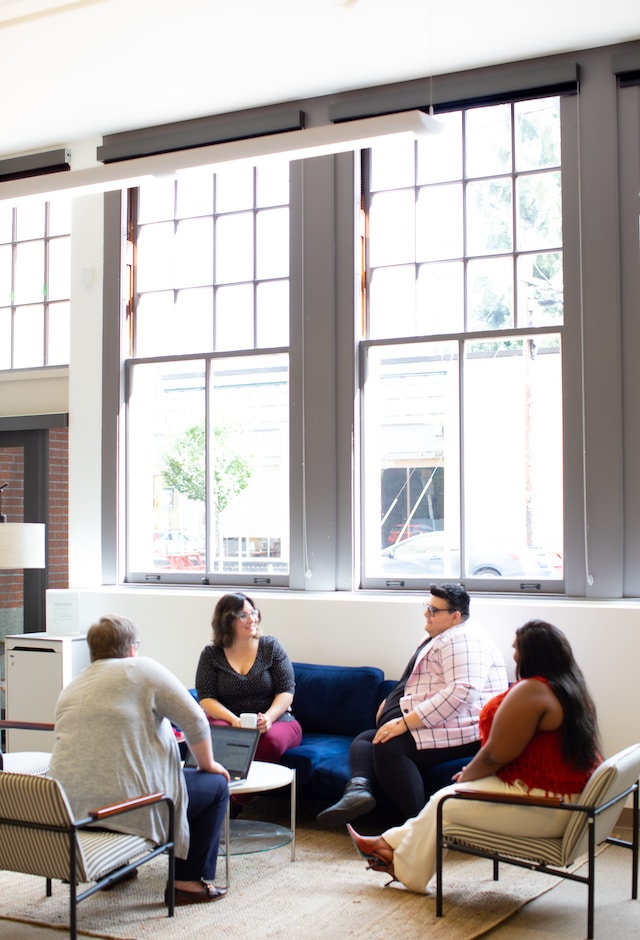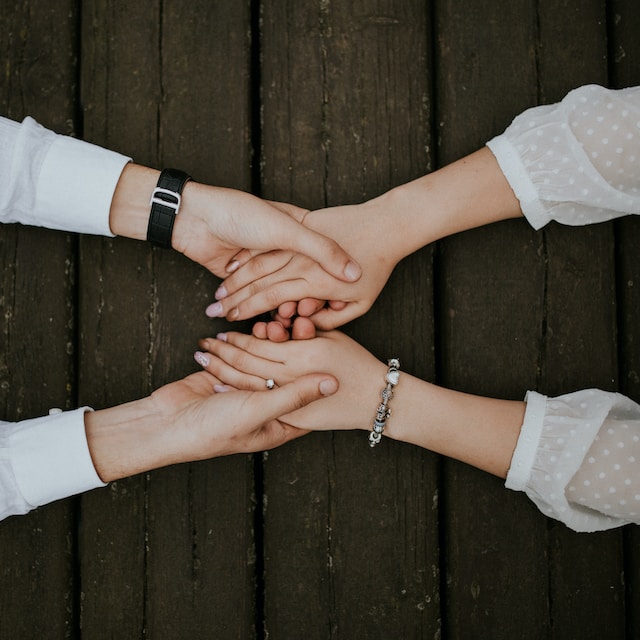Support groups are an incredibly helpful part of so many recovery journeys, but they can be intimidating to join!” And, we don’t blame you for feeling nervous. Logging on to a virtual meeting full of strangers to talk about a vulnerable topic isn’t the easiest thing to do. However, eating disorder support groups are welcoming spaces that can help those in recovery cope and find community in the healing process. Here, we walk you through what an eating disorder support group is and how it functions to give you and your loved ones a better idea of what to expect before you click “register.”
What Is an Eating Disorder Support Group?
An eating disorder support group is a gathering of folks who come together to share their experiences, concerns, and emotions related to their mental health diagnoses. Led by a facilitator, the primary purpose of a support group is to provide mutual support, understanding, and empathy among its members. Support groups find a safe and non-judgmental space for participants to connect and help each other navigate the successes and challenges that come with the journey to recovery.
The Importance of Community
Eating disorders affect a significant number of people, yet the stigma surrounding them often leaves those suffering feeling further isolated. Support groups are a way to offer a sense of community in the healing process. The Alliance hosts free, therapist-led eating disorder support groups, available both virtually and in person. In these groups, those grappling with eating disorders and their loved ones can find a community that truly understands their struggles.
Support groups are totally confidential, but they have a powerful impact. Groups provide a safe space to share your thoughts, talk through coping strategies, or simply feel buoyed by emotional support. Although recovery is the goal for all participants, these support groups welcome folks at any part of their ED recovery journey. Healing will look different for everyone, and support groups can be the perfect compliment to other supports such as therapists, dietitians, psychiatric care, and higher levels of care. Support groups provide the perfect complement to these other modalities. In addition to providing a sense of community, here’s what you can expect to gain from eating disorder support groups:
- Validation: In these groups, you’ll find a community that understands what you’re going through because they’ve been there too. This shared understanding can be immensely validating, making you feel less alone in your struggles
- Learning From Others: From shared coping strategies to stories of successes and setbacks, you can learn insights from hearing about other’s experiences.
- Emotional Support: Support groups offer a safe space to express your feelings and fears without judgment. Being able to share your emotions openly can also reduce the emotional burden that often accompanies eating disorders.
Types of Eating Disorder Support Groups
Every person’s journey to recovery may look a bit different, and we understand one single support group won’t fit every individual’s needs. In order to create more accessibility, we offer a few different kinds of support groups at different times during the week. Our hope is that everyone can find a space and community that fits into their individual recovery journey and schedule. This goes for both people in recovery, those just starting to understand their ED, and their loved ones.
General Support Groups
Open to everybody 18 and up, recovery support groups are dedicated to fostering a positive and supportive mindset in individuals recovering from eating disorders. Led by licensed clinicians, these groups focus on building a supportive community that empowers individuals on their path to recovery. Since these groups are offered virtually, they are available to anyone, regardless of geographical constraints. The Alliance virtual pro-recovery support group meets on:
- Tuesday Evenings 7:00 PM EST / 4:00 PM PST
- Thursday Evenings 7:00 PM EST / 4:00 PM PST
- Saturday Mornings 11:00 AM EST / 8:00 AM PST
LGBTQ+ Support Groups
Folks in the LGBTQ+ community experience a higher prevalence of eating disorders than the general population. Recognizing the diverse needs within the LGBTQ+ community, these support groups are specifically tailored for individuals (ages 18+) who identify as LGBTQ+ and are dealing with eating disorders. Led by queer therapists, these groups create safe and affirming spaces where individuals can explore their unique challenges and experiences. The Alliance offers an LGBTQ+ support group on:
- Wednesday Evenings 7:00 PM EST / 4:00 PM PST
Support for Loved Ones
Eating disorders impact not only individuals experiencing them but also their loved ones. Friends, family, and caregivers play a crucial role in the recovery process. The Friends & Family Support Group is designed exclusively for loved ones (ages 12+ with a guardian). In this space, friends and family members can share their experiences and learn how best to support their loved one’s journey to recovery. It offers a unique opportunity for mutual support and understanding. The Alliance offers a weekly support group for friends and families on:
- Thursday Evenings 7:00 PM EST / 4:00 PM PST
Eating Disorder Support Groups: What to Expect
Knowing the value of a support group is helpful, but it doesn’t get rid of the nerves you may feel when stepping into a new experience. Eating disorder support groups are all about providing a validating and welcoming community, and that starts now. Yes, feeling wary of joining an online support group is normal. To help quell some of those nerves, we’ll give you a look at what to expect when you join one of our support groups.
First of all, let’s get the lay of the land.
- Group Size: There is no limit to the number of participants who can join our support groups, and attendance typically ranges from 25 to around 100, depending on the group and week.
- Facilitators: We have 3-5 facilitators in each support group, all of whom are trained eating disorder therapists with many having lived experience. The clinicians establish group rules and guidelines, introduce the topic and guide discussions. They actively participate in providing psychoeducation and support
- Duration of Sessions: Our support group sessions typically last for 90 minutes. We also offer a few monthly groups that are 60 minutes long to accommodate varying schedules and preferences.
What Will You Talk About?
The beauty of our support groups lies in their attendee-driven nature. We believe in meeting you where you are in your recovery journey, so topics are chosen based on your requests. At the start of each session, our group leader invites attendees to message them with topics, questions, themes, or thoughts they’d like to explore. Rachel Rifken (LMHC, CEDS), the support group manager with The Alliance, shared some insight into how facilitators frame the discussion,
“Often we will combine topics together if we notice a theme. Depending on the conversation, we bring in multiple topics or add on topics to continue the discussion and needs of the group. We also keep track of topics discussed and requested to revisit in future groups.”
The topics will differ every week. Some sessions might focus on how to embrace vulnerability and accountability on your recovery journey while others discuss practical strategies for applying coping skills in daily life. Throughout these enriching discussions, the focus lies on the underlying emotions, challenges, and recovery experiences rather than specific eating disorder behaviors or numbers.
Expectations Around Anonymity and Participation
Eating disorder support groups are here for you. We understand that some folks might prefer to remain anonymous. While we ask participants to register for the group, your information remains confidential. We do require participants to have their video cameras on at all times, but you can adjust your camera settings for privacy. Sound is muted unless you choose to share by raising your hand through Zoom’s reaction button. You are welcome to simply listen, participate via chat, or engage verbally—whatever feels right for you.
Each session is structured to ensure a safe and supportive environment. Our sessions maintain a pro-recovery focus, helping to reduce moments when eating disorder thoughts might lead to unhelpful comparisons or disconnection. We often conclude with a celebration of recovery wins and intentions, allowing participants to share their achievements with a supportive community.
Join an Eating Disorder Support Group with The Alliance
The Alliance offers the only free support groups that are led by trained mental health professionals. While other groups are valuable resources, they are often peer-led or have attendance limitations and associated costs. Our groups combine the peer-to-peer support dynamic with the expertise of trained clinicians who understand the complexities of eating disorders.
What truly sets us apart is our diverse and global community. Attendees come from different backgrounds, ages, and stages of recovery, often finding unexpected connections and support from each other. Rifkin sees the power in the support groups every week,”It’s so magical to witness someone who continues coming to a group and how they receive support from others and how that truly impacts their willingness and progress in recovery!”
You can learn more about our virtual support group offerings on our page here. In addition to the weekly groups listed above, we offer monthly support groups for folks working in the fashion industry and for family members and friends who have lost a loved one to an eating disorder. If you want to learn more about our support groups, find providers, or access other healthcare resources, call our helpline at +1 (866) 662-1235. Join our support groups to connect, share, and find the encouragement you need to embrace your path to eating disorder recovery.


